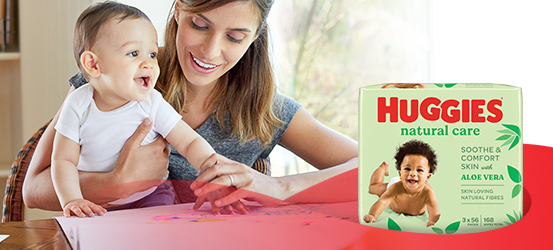Don’t take your 19-month-old too seriously or worry they can’t focus for too long. Having a short attention span is characteristic of this age and is entirely normal. It’s also completely age-appropriate for your toddler to protest and escalate easily to frustration. This is not an indication that they will always be impatient, it’s just that they don’t yet have the cognitive ability to understand how things work.
Blocks that fall over when they’re stacked too high, shape toys that aren’t inserted in their matching holes and even toys that won’t line up and sit as they should do, will all incite a fresh outburst. Try to stay calm and in check of your own emotions when your toddler escalates. They still need your help to learn how to regulate their emotions and not feel overwhelmed by their angry feelings.
But it’s not all rage and frustration at 19 months. This is also the age when humour makes an appearance and you’ll find your toddler has discovered how to giggle. If you pull a silly face and make a little joke, tickle them gently or sing a silly song they will understand the ridiculousness of it all.
Growth and development
Notice that your toddler’s clothes seem to have shrunk a bit lately? Or have they just woken up one morning and seem to have grown overnight? Reassure yourself that this is not your imagination but is in fact probably true. Children do grow more when they are asleep because this is when they release growth hormones. They are also conserving energy and consolidating memories, all vital processes towards their overall growth and development.
Your toddler’s growth now will have slowed down when compared to their growth in the first 12 months, so don’t expect the same patterns of weight gain now as previously.
Your toddler is also likely to grow more during spring and summer and slow down a little during the cooler months of the year. They will go through periods where their growth seems to plateau and they stay at the same size and weight for a while. Then it is as if someone has turned on a switch and they have a growth spurt. By fits and starts, two steps forward, one step back, that’s the usual pattern of growth and development over the toddler years.
Play and interaction
“Busy and active” are the words to describe your 19-month-old. From the moment they wake up to when their little head meets the pillow, they’ll be into everything and drawn to touch and examine. Which means you’ll need to be vigilant about where they are and what they’re doing. If you haven’t seen them for a while and there’s a notable absence of sound, be assured that your toddler is up to no good.
Keep gates across doorways and doors closed if you want to limit their access through the house. Teach them what’s involved in safely climbing down stairs and make sure they don’t go down backwards. Show them how to use handrails and encourage them to wait for you to come and be with them.
You’ll become very used to hearing your toddler calling you throughout the day (and perhaps the night) which is why many parents develop selective deafness at this time. Constant calls for “mommy” or “daddy” at various levels of intensity will make you feel as if you are at their beck and call.
Although this is an independent stage for your toddler, they will still need your help to engage in play and be entertained. They will also need comforting when life just gets a little too big for them. Just when you think your toddler is growing up too quickly, they will remind you that they are still very young.
What you can expect this month
New words and sounds will come from your toddler this month, some more intelligible than others. They’ll be learning how to string 2-3 words together such as “my ball here” and be able to identify familiar people by their names. They’ll also look for the family pets and make different animal noises when they spot one. Cows may be known as “moos”, dogs as “woofs” and cats as “meows”. At 19 months toddlers love to mimic, so if you’re prone to a little swearing, watch your own language – someone is listening!
You’ll have a tired little person in the household each night, and by 7-7.30pm they will want to go to bed. Most toddlers still need around 12 hours sleep each night and, without it, they’re pretty cranky. When combined with a day time sleep of 1½-2hours, this is enough for the average toddler to get through their day with sufficient energy and enthusiasm.
Expect your toddler to be involved in everything you are these days. They will want to help you and be part of your world. Gone are the days of you being able to leave an ordered pile of notes or craft sitting in a corner. Before you know it they will be relocated to the furthest reaches of the house. This means you’ll need to be imaginative about storage and stashing things away.
Food and nutrition
If your toddler isn’t keen to try new foods, introduce what’s unfamiliar with other foods they do like. It is common for toddlers to reject a new food many times before they’ll give it a try. It is also normal for toddlers to be suspicious of anything new and this behaviour will be reflected during meal times.
Limit main meals to around 20-30 minutes and snacks to around 10-20 minutes. Your toddler will lose interest in eating after a reasonably short time so be sensitive to their cues that they have eaten enough. Turning their head away when you offer more, saying no, trying to climb out of their booster seat or high chair, and pushing the plate away are clear signs that they have had enough or are just not interested.
Avoid offering your toddler treats or rewards of food. This can set up poor eating patterns that can lead to problems later on. We all develop a relationship with food that works best if it does not become dysfunctional.
If your 19-month-old is drinking too much milk, this will impact on how much food they want to eat at meal times. More than 500mls/day can be too much. If you are still breastfeeding, more than 3-4 breastfeeds/day could also impact on your toddler’s appetite. If you’re finding your toddler is breastfeeding through the night and is picky with their meals, then you would both benefit from stopping these overnight feeds and limiting breastfeeds to the day.
Toddlers, whose main source of nutrition is breast milk, tend to be low in iron and can develop anaemia. Because of this, their appetite is reduced further. Check with your healthcare professional that your toddler is growing as they need to and is eating sufficiently nutritious food to grow well.
Keeping your toddler healthy
Some toddlers seem to develop a permanent cold, especially during the winter months. Having an underdeveloped immune system, and not having had the opportunity to develop any immunity to the hundreds of “cold” viruses out there, causes them to be particularly susceptible.
Viruses do not respond to antibiotics, which is why there is no cure for the cold as yet. If your toddler does develop a cold, make sure they have plenty of fluids to drink, extra cuddles, and a quiet few days at home to support their immune system to do its work.
Ear infections are also reasonably common in toddlers whose Eustachian tubes are shorter and softer than in older children. If you’re finding your toddler is prone to middle ear infections, be reassured that the majority of children grow out of this problem.
If your toddler refuses to drink, is vomiting or particularly sleepy, have them checked by a doctor. Breathing difficulties or an elevated temperature are also signs that they need to be medically assessed. One of the first symptoms you may notice when your child is developing a cold is that their breath may smell different, or you may just have a sense that they aren’t well. It’s always important to follow your own instincts and have your child checked if you are concerned. You are the expert when it comes to your toddler and know them better than anyone else.
General Tips
If your toddler is prone to constipation make sure they have access to plenty of water.
Reluctant drinkers will often be persuaded to drink from a novelty container, or when in the bath, or even during play times from a hose.
Get your toddler a little bike or tricycle to wheel around on.
Learning how to coordinate their leg movements and balancing will come with time.
If your toddler still has a dummy, think about stopping it.
Dummies at this age can delay speech development and tend to pacify a toddler when they should be more vocal. They also give toddlers emotional comforting when this needs to come from other humans.
Watch the toys your toddler has access to and make sure they’re suitable for this age and stage.
- This is still a very oral period of development and your toddler is likely to want to bite, chew, suck and gnaw their way through the contents of their toy box.



















